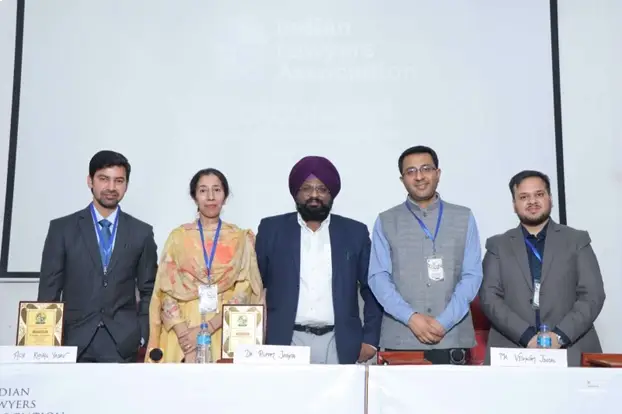Our Terms & Conditions | Our Privacy Policy
ILACON 2025: A Vision For A Modern Legal Framework In India
By Shruti Kochar and Swati Gupta
AMRITSAR – ILACON 2025 opened here with a compelling keynote address by Nirmal Preet Singh Hira, President of ILA Amritsar. In his speech, Hira underscored the pressing need for the Indian legal profession to organize and modernize. He emphasized on April 26, that, unlike other professions that have developed robust institutional frameworks, Indian lawyers remain bound by outdated regulations—such as the prohibition on advertising and contingency lawyering—that ultimately hinder access to justice, especially for the underprivileged.
Panel 1: Speedy Trials and Legal Innovation
The first of five panels, moderated by Kunal Yadav, focused on the urgent need for timely justice. Citing the Mansoor Mansur case, Yadav highlighted how procedural delays can have dire consequences and underscored the importance of fair legal representation.
Prof. Rupam Jagota emphasized the potential of artificial intelligence and specialized courts in enhancing judicial efficiency. Vishwam Jindal offered a global perspective by sharing his experiences with international online arbitration, showcasing how legal technology is transforming dispute resolution. Vasu Aggarwal compared justice systems worldwide, advocating for reforms in India to uphold Article 21 of the Constitution and reduce case backlogs.
The panel collectively echoed a powerful message: India’s legal system must embrace innovation, collaboration, and reform to ensure timely and accessible justice.

Panel 2: Rethinking Litigation and Arbitration
The second session turned the spotlight on the evolving landscape of litigation and arbitration. A distinguished panel included Hasit Seth (Arbitrator, Counsel & Mediator at HLaw), Mumtaz Bhalla (Advocate on Record and Partner at Economic Laws Practice), Justice Talwant Singh (former Judge, Delhi High Court), Dr. Vineet Kothari (former Judge, Gujarat High Court), and Amanat Kahlon (Assistant Professor, Chandigarh University).

The discussion focused on how arbitration can ease the burden on the judiciary and streamline complex legal matters. The panelists emphasized the importance of clarity, accessibility, and modernization in litigation practices to make dispute resolution more efficient and citizen-friendly.
Following the session, attendees were treated to a lavish six-course lunch—a highlight especially appreciated by the student participants, fostering moments of camaraderie and connection.

Panel 3: Cybercrime and Environmental Law
The post-lunch keynote was delivered by Dr. Varun Kapoor, IPS, Special Director General of Police, RAPTC Indore. Addressing the growing threat of cybercrime, Dr. Kapoor highlighted how digital dangers are becoming some of the most pervasive and personal risks of our time. He called on legal professionals to prioritize cyber law, stressing the need for awareness, education, and specialization to protect citizens in the digital age. His central message was clear: legal frameworks must evolve as quickly as the technologies that challenge them.

The second keynote of the session was delivered by Shubham Bhalla, Advocate-on-Record at the Supreme Court. Bhalla discussed the rising threat of microplastics and their detrimental impact on the environment. He praised the pioneering environmental reforms led by Justice Kuldeep Singh and reviewed existing legal mechanisms, such as the National Green Tribunal (NGT), designed to combat deforestation and environmental degradation. His talk also addressed compensation for ecological damage and called for stricter enforcement of environmental laws.

Panel 4: The Changing Landscape of Criminal Law
The final panel of the day was moderated by Justice Rajan Gupta, Chairman of the Haryana Real Estate Appellate Tribunal and former Judge of the Patna High Court. Justice Gupta spoke about the colonial roots of India’s criminal laws and advocated for a complete overhaul of the Indian Penal Code. He also discussed the integration of technology to expedite investigations and trials, along with the need to strengthen protections for women and children.
Joining him were Justice Rekha Palli (former Judge, Delhi High Court), Advocate Raman Bawa, and Advocate Ravinder Randhawa (Founder, R & S Associates). The panelists explored reforms aimed at safeguarding victim rights, phasing out colonial legal provisions, and incorporating virtual investigations and modern safeguards into the criminal justice system.

Closing Ceremony and Recognitions
The event concluded with a ceremony honoring all panelists, who received appreciation mementos presented by Nirmal Preet Singh Hira and other distinguished guests—Advocates Tarun, Majinder, and Vishal. Meenu Gupta, Head of the Department of Law at Guru Nanak Dev University, was also recognized for her continuous support and cooperation throughout the event.

Among the volunteers, several students who played a key role in ensuring the smooth execution of ILACON 2025 were awarded internships and certificates for their exceptional time management and dedication. All other volunteers were also recognized with certificates of appreciation.

Images are for reference only.Images and contents gathered automatic from google or 3rd party sources.All rights on the images and contents are with their legal original owners.



Comments are closed.